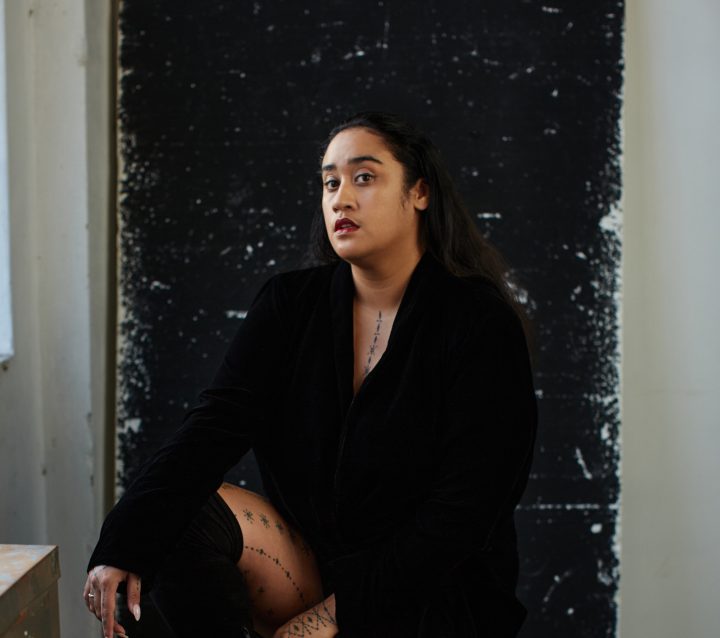Please tell us your story! How did you get to where you are today?
I grew up loving music and then eventually wound up being surrounded by different sounds and live performances as a teenager. I began music writing when I was at university, and it quickly overtook any lingering passion I had for the degree I was completing at the time so, by the time I finished up and graduated, I was already deep in the trenches reviewing shows and whatever I could get my hands on and ears around.
I moved to Melbourne near the end of 2017 and got back into freelancing around the same time, which then led to various roles – from music PR to community radio, to hosting, and more industry development roles, which has kept me busy and challenged. I’ve done my best writing since being here though, and I’m forever grateful for the opportunities that have come my way that have kept me inspired and motivated.
Why did you want to get into the music industry?
I was part of a contemporary Pacific dance company for almost ten years, during my adolescence – which is a pretty chaotic time for any young person trying to figure out who they are. It was an impactful time for me in many ways, but being able to experience the rush of not just being on stage, but being part of an experience with a crowd that is so unique, was really interesting to me early on. I always loved music but had no technical ability or creative ability on that side, but I always liked the element of storytelling. Coupling the above feeling that live performances gave me, and a general curiosity for how musicians and artists create, it set me on a course fairly early on towards this space.
Do you feel that higher education is a necessary step to enter the music industry?
Not necessarily. I guess it depends on what role you want to pursue. It definitely wasn’t necessary for me to get where I am today, though I don’t discount those years I spent studying either. It gave me the opportunity to learn more about myself and what I wanted to do, and also gave me skills that I’ve been able to take with me into a professional career.
“Never let anyone minimise your feelings or your opinions.“
What is your big picture career goal?
I want to keep championing diverse voices, whether it be in print/online journalism, or via radio. I also want to be pushing these stories and our presence internationally as well – the hunger from international audiences is there, so I want to help in any way possible to bridge those gaps.
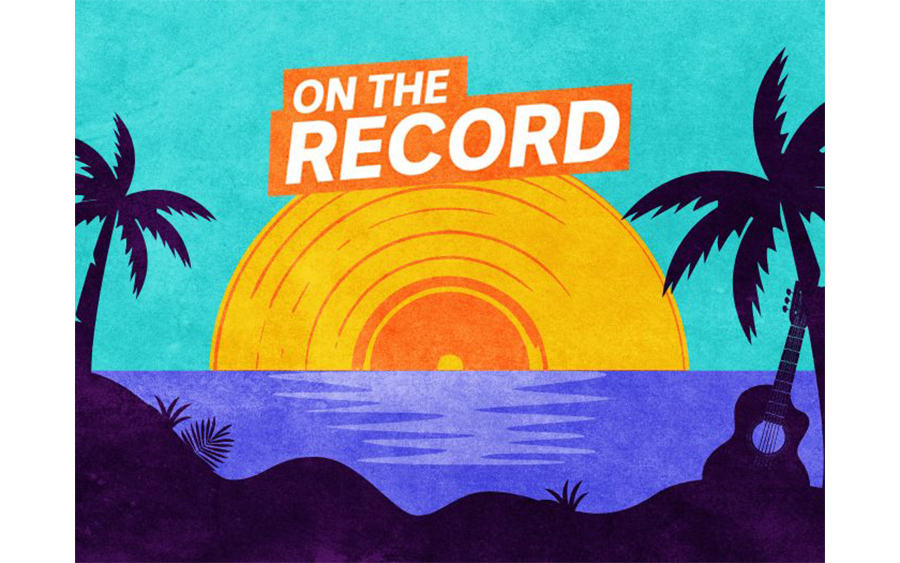
Let’s talk about the highs vs the lows of your career. What is your greatest achievement?
There have been a number of things I’ve been proud of…the last few years have brought some great ones though.
Helping to develop The Music Writer’s Lab, which is a music writing intensive program for emerging writers around the country, has been something I’m incredibly proud of. I wish I had something like this available when I was getting started. Though it’s still finding its way, the impact I’ve seen of just providing confidence and a sense of nurturing for writers who wanted a sense of community as much as direction on where to take their careers, has been great.
We have been able to take it to BIGSOUND twice so far, and adapt the format for a South Australian edition focused around WOMADelaide, so I’m interested in seeing where we can continue to take it.
In 2023, I launched On The Record on ABC Radio Australia; a dedicated music interviews show that platforms artists from the Pacific Islands and the diaspora. It’s been one of the most fulfilling projects I’ve been involved in growing from the ground up, connecting a global network of artists with audiences in over 10 island nations, as well as spreading the word through Australian channels, has been wonderful.
Who has been your biggest champion in your career?
Having the support of my family and loved ones has been crucial. When things get full on with work, I know I can be a chaotic mess sometimes, but knowing I have their backing and support makes me feel calm and know that it’s all going towards doing something worthwhile.
Who are your role models in the industry be they local or international?
Local role models include women like Helen Marcou and Kirsty Rivers – they were two figures who really scooped me up under their wing when I first got to Melbourne and I am so grateful to consider them friends as well as collaborators over the years. And then, some of my best friends like Michelle Grace Hunder and Janine Morcos; women whose resilience and determination in an industry that isn’t always kind, they keep me going and we uplift and hold each other up.
What is the best piece of life advice you’ve ever received?
The late Iain Shedden told me the first time I met him that if I didn’t have confidence in myself, my readers would be able to see straight through whatever words I was spinning. And that stuck with me, especially now when we see a lot of work being created from a place of inauthenticity and insecurity. Love on, and care for yourself.
Who are your top 3 ‘artists to watch’?
Bumpy – Phenomenal vocalist, one of the kindest souls you’ll meet as well.
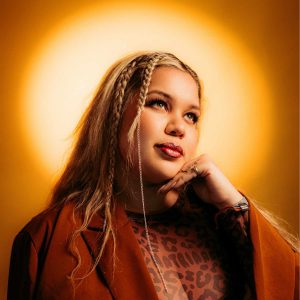
Kaiit – Sis is coming through with new music for the first time in a MINUTE this year, I can’t wait.
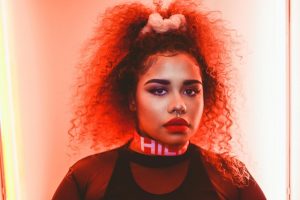
Elle Shimada – I’ve been falling back in love with Elle’s music over the summer and I know she’s already a known name locally, but I can’t wait for more people around the country and the world to fall for her as well.
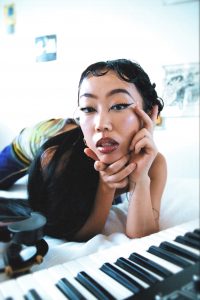
Why does representation matter?
Simply, if you can’t see it, you can’t be it. It’s gotten a lot better in the last handful of years, but when I first got into the industry, I could maybe count on one hand, the brown or Pacific Islander faces who were in the door ahead of me. It was very isolating early on and made me question if my opinions would ever be welcome. Seeing how inspired younger artists are simply by seeing others who look like them being given seats at the table, is so wonderful, because even if you try and it doesn’t work the first time, you know your people are there with you.
What does true allyship look like to you?
Not being afraid to stand on ten, even if it means slight discomfort to your sense of normal. Showing up for those who need you there, even if it is just for reassurance.
Do you think the Australian Music Industry is where it needs to be in regarding diversity? If yes or no, what would you like to see?
It’s on its way, but there’s still a lot of work to be done. More programming of diverse music on radio stations, unique and interesting programming at a showcase festival level…showing artists and those who want to exist and operate in these spaces behind the scenes that they are welcome, and belong.
How does Australia compare to international markets when it comes to BI&POC representation in mainstream media?
It still feels a good decade behind. Especially when we think about the North American and British markets. There is a growing community of fantastic creators in media here from BI&POC backgrounds, which is so good to see; but we need to see more local avenues for coverage open up to give our writers, our photographers; as well as our BI&POC artists, the platform to express and be taken seriously.
Tokenism, Colourism, Discrimination & Representation are extremely important issues that are lightly discussed in the music industry, particularly in panels.
As a BI&POC person, have you seen positives that have come from those discussions?
I mean, the fact there are more of these conversations being had, is a positive. We need more of them, organised and conceptualised by different voices too. But that comes with feeling comfortable in these spaces to lead these discussions; historically this hasn’t always been the case.
Do they delve deep enough?
Unfortunately no – none of these discussions do, if we’re talking about the panels specifically; you can only really scratch the surface in a 45 minute session. But I am enjoying that the topics and overarching briefs of some of these panels are very sharp and illuminating – they get to the point real quick.
Is there anything missing from the conversation?
White industry, which sounds like a joke, but I’m serious! We need more people in these rooms who are in positions of power, who have the platform to help us inform change. We need more people who need to be in those rooms, in those rooms. Of course, having our own people in these conversations and showing up to support is crucial, but it does feel like we are preaching to the choir at some of these things.
What is performance activism?
Stems from inauthenticity, 100%. We will always be able to tell if your activism is performative because at the end of the day, we remember those whose voices go silent when we need them the most. When we need them the most, to sometimes just do the bare minimum.
How can allies in the music industry best support BI&POC artists and avoid performative activism?
Honestly, it can start by just listening. Listening openly and with a dedicated heart. Do not assume you know what is best for every BI&POC artists just because you have seen one or two success stories within the industry. Each journey is different and when you then factor in cultural and identity pathways, it becomes even more textured and layered. So listen, actually listen, and work with the artists; do not assume that you’re saving them. They don’t need your saving. Build with them.
What does a BI&POC safe space look like to you?
A space where we’re not rushed, a space where our ideas and thoughts are listened to with intent. A space where like I said before, we’re being collaborated with, not given a pity hand. Building towards an industry that is sustainable for continued learning and creative expression. At its core, a safe space for me is one that is filled with warmth and laughter (it sounds lame); some of my most creative moments have come from being in rooms with other folks who I know who have tread similar if not the same paths as me – that level of connection is unlike any other.
Music & activism have always gone hand in hand, when together it is powerful & influential. Why do you think that is so?
Music hits people in all different ways, it has the ability to trigger emotional responses in people that can leave long-standing impacts and effects. Using music as a vessel for activism feels natural because the melodies, the chants, the emotional core of spreading a message that is important and that needs to be heard, is something so universal.
“Honestly, it can start by just listening. Listening openly and with a dedicated heart. Do not assume you know what is best for every BI&POC artists just because you have seen one or two success stories within the industry. Each journey is different and when you then factor in cultural and identity pathways, it becomes even more textured and layered. So listen, actually listen, and work with the artists; do not assume that you’re saving them. They don’t need your saving. Build with them.”
What advice do you have for BI&POC folk who are coming up in the industry, particularly in your line of work?
Never let anyone minimise your feelings or your opinions. If you know where your passions lay, lean into them and let your individuality fly – I have found the majority of opportunities that have come my way began streaming in once I fully embraced how my different journey into this scene actually bolstered my work, and gave me a different perspective. The media industry is so bland and uninspiring in many ways and it’s time for new air to be breathed into it. So if you’re wanting to get involved, take that big inhale and don’t be afraid to exhale.
What was it like growing up & experiencing the industry outside looking in? Now that you’re in it, what has your experience been like?
Before I got into it, I didn’t really have a grasp on what “the industry” was. I don’t even think I factored it in, when I decided I wanted to be a music writer; it was just something that came as a byproduct of writing about the music and musicians I loved. But again, at that time, I could tell it was very male-dominant, and very set in its ways.
When I first properly started to get momentum within the industry, I was only 23 or 24, so navigating that space as a young person who was already used to being othered in some way, was interesting. I had developed a pretty thick skin early on, which helped; and because I didn’t really see anyone who I saw myself in, I was concentrating on building myself up and using each opportunity to be in rooms and let the work speak for itself.
Now, over 10 years in, I feel accomplished but so much more fulfilled to be in a position to hold the door open for others and really write and develop projects that I am super passionate about.
I haven’t experienced trauma in this industry on the same level as many other women I have known over the years; though I have seen such damaging behaviours exhibited by many, and it’s been crushing to see that there are still ripple effects of those ingrained cultures existing today. It does feel good knowing that there are growing numbers of outlets that people feel comfortable in turning to within the industry, where they can seek help.
The ARIAS just announced an advisory panel of 17 industry experts in RnB & Hip Hop to elevate issues and address priorities to grow its presence. Sose Fuamoli has been announced as one of the esteemed panelist.
As a panel member, what do you hope this panel achieves for the music industry?
I hope that we can start to mend bridges that have been burned in the past by ARIA when it comes to meaningful connection and representation of our hip hop and R&B communities. And from there, build new frameworks and structures that artists from both can actively use to achieve personal and creative success.
I don’t work for ARIA, so I can’t speak for them, but I know when I was approached in 2023 to essentially do some consultancy work in starting new discussions around what needs to change with regards to nomination criteria and general treatment of these genres, I knew it was an opportunity I couldn’t turn down.
It’s going to be a lot of work and change isn’t going to happen overnight, but I do think that we can lay some good groundwork that future advisory groups can continue to build upon.
Like Nipsey said, the marathon continues. Each step forward is one towards something hopefully bigger and better for us all.
How important is it to recognise how music & culture make up an identity of a people?
Very. Music is a vessel for storytelling and in Pacific Island cultures, we are definitely ancient storytellers. It’s how our histories were passed on from island to island, down through generations; through the traditional formats, but also through oral traditions, and music has always been a big part of that. Doing a show like On The Record has been opening my mind up to so many different cultural sounds. I already thought I had a good hold on what music from Fiji sounded like; what music from Papua New Guinea and the Cook Islands sound like…it’s become so much more than that, and I think that makes Nesians of all walks of life awesome.
Your show ‘On The Record,’ on ABC Pacific delves into the importance of music & culture with guests who are from the greater Pacific region. What is the overall message you hope listeners take away from your show?
Oh man, this has been so much fun. What I’ve loved about developing this show is showing that regardless of your islander heritage, there is such a beautiful connective tissue that joins us through the music. The show is definitely a music show, but the conversations I’ve had with artists about identity politics, the struggles a lot of us face as biracial people; the struggles people have been brought up away from their mother or father lands… On The Record has become so much more than I thought it could be. For those outside the islands and the diaspora, I hope they can find new artists through the show and see that there are so many gorgeous music communities thriving…in the case of Australia, in really close proximity to us!
Self identity & imposter syndrome are issues women in the industry struggle with. Have you faced this issue? If so/not, what tips can you give to encourage others to stand in their truth?
I think I still suffer from it. Years of being underpaid and told I’m on the same footing as a male counterpart, to find out after the fact I was being severely undervalued – both financially, and creatively – still has an impact on how I move in certain situations today. Which I’m working on. Honestly, just building trust in yourself and your abilities is a big thing I would say to focus on. If you work on your craft, you love your work and feel proud to stand by it, nobody can take that away from you.
I came through at a time where it was heavily implied that if I hadn’t made some crucial or career-defining contribution to the landscape by the time I was 27, I was done. It’s horrible to think about that now, because I truly believe I’m doing my best work and having the best momentum now as I head towards my mid-30s. And it’s because I trust myself and know that the work I’m doing, even if one person connects with it on some meaningful level, then that’s impactful enough.
Most people don’t see the mountain of work that goes into your work till you’re towards the peak, what was the hardest obstacle you’ve had to overcome as a journalist?
Probably dealing with the changing landscape. When I first started, the online music press was booming. There was a healthy climate for live reviews, CD reviews, across genres. Seeing these numbers whittle down over the years; independent outlets becoming fewer and fewer, and even some of the majors being swallowed up by larger parent companies…it’s been dejecting to watch. And as someone whose first love was longform journalism, this was a particularly hard pill to swallow initially. But, as all things do, we’re starting to see a resurgence in investment in longform and more in depth coverage – I hope this continues.
“I want to keep championing diverse voices, whether it be in print/online journalism, or via radio. I also want to be pushing these stories and our presence internationally as well – the hunger from international audiences is there, so I want to help in any way possible to bridge those gaps.”
What would you tell your younger self if you could tell them anything?
I would have told her to stop working for less than what she was worth, a LOT earlier. The deterioration of my mental health during some of those years was something I wouldn’t wish on any young creative.
As a journalist you are privy to what happens behind the scenes more than most, is there a message you would like to give to others in the industry that don’t work in your field? Eg. Bookers, label leaders, producers etc.
Good question… the media industry may seem like it’s going down in flames but there are still a lot of us who are in it because we love helping to further the message you/your artist is hoping to tell with their music. Connect with us! It’s time that the adage of music journalists and critics being the devil dies out.
What can we all look forward to for 2024, any big projects you can let us in on?
I’m launching a new show on ABC Radio Australia / ABC Pacific that will be very exciting to bring more light to soon; but it’s going to be very, very cool. I’m working on trying to be back on the international circuit more in 2024 as well; I had some incredibly fulfilling experiences in Germany last year that I’d love to continue exploring this year. There’s always new things bubbling away on my end, so we’ll just wait and see!
What is your go-to Karaoke song?
As many karaoke joints in Japan had the [mis]fortune of discovering last year, it’d have to be a tie between Luther Vandross (‘Never Too Much’) or Celine Dion (‘It’s All Coming Back To Me Now’).
